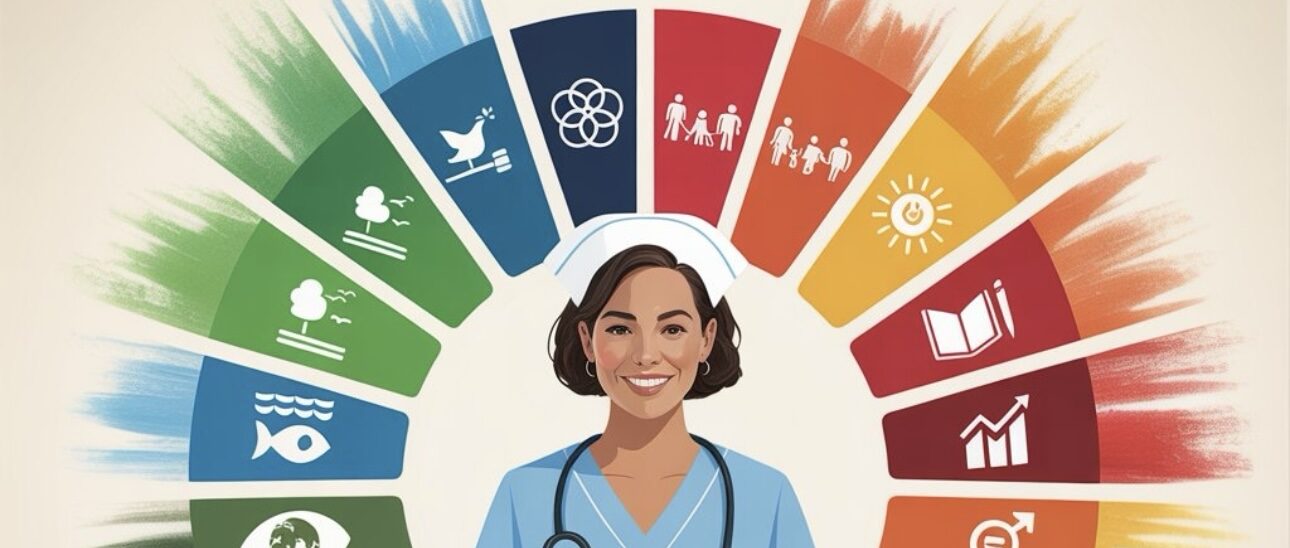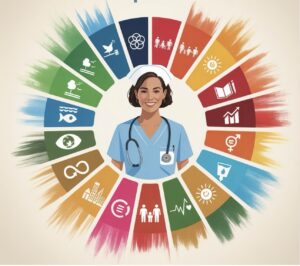
Nursing Education and the Sustainable Development Goals (SDGs): Empowering Future Health Professionals for Sustainable Global Impact
2 October 2025
Nursing Education and the Sustainable Development Goals (SDGs): Empowering Future Health Professionals for Sustainable Global Impact
How can we ensure that, as educators, we are teaching students locally but preparing them to think and act globally? One approach is to engage in innovative ways of teaching that empower students with the knowledge to see their place in addressing global challenges. In this blog, we reflect on a workshop titled “The United Nations Sustainable Development Goals (UN SDGs) and You as a Future Nurse,” which was delivered to third-year BSc Nursing students at the University of Exeter. The objectives were to understand students’ experience and perspectives of sustainability and SDGs, enhance their understanding, while inspiring them to think critically about their role and how they can help in achieving the SDGs.
One step at a time: University of Exeter’s (UoE) SDG journey
In 2019, the University of Exeter committed to the UN SDG accord, pledging to embed SDGs in all university activities while reporting on progress annually (SDG Accord, 2019). These efforts have enabled the university to rank in the top 30 globally for advancements made in delivering the SDGs (THE, 2025). The university’s Curriculum for Change (C4C) also tasks academics with embedding SDGs into teaching. Through the Grand Challenges, students can also engage with real-world problems that address global problems.
Workshop Delivery Format
Dr Winifred Nyinoh and Dr Kinan Mokbel organised this interactive workshop, which began with an icebreaker to rate students’ current knowledge of SDGs. Slides were used to introduce students to the SDGs, why universities are embedding SDGs in the curriculum, and the importance of learning about SDGs. These five key reasons were explored for embedding SDGs in nursing education:
- Inspire students to become global citizens.
- Link classroom learning to real-world global issues.
- Promote innovation, critical thinking and problem-solving skills to devise sustainable solutions.
- Champion responsibility and action on how individual choices and actions affect the planet and others.
- Support national and global priorities by contributing to policy development and civic engagement.
This was followed by a small breakout group for discussion and tasks. This was the most impactful part of the session. Group 1 discussed their knowledge of SDGs, shared experiences of how they experience sustainability or the SDGs. Group 2 collated their experiences of how they have engaged with and recognised the presence of the sustainability or SDGs throughout their university experience, and Group 3 selected one SDG and designed a practical intervention or campaign that they could lead on or support.
Takeaways from the workshop
For the icebreaker, 50% of the participants agreed they had limited, 20% had moderate, 20% had a good understanding, and 10% had excellent understanding of the SDGs. For activity 1, students identified learning about the SDGs in health promotion topics. There were also discussions about the strong link between SDGs and nursing, poverty, hunger, good health and wellbeing, education, and gender equality.
For activity 2, the topic of using less plastic was discussed and students, such as a small charge in the campus café for using a disposable paper cup. They noted that this initiative promotes environmental sustainability, reduces waste, and encourages responsible behaviour. According to the participants, sustainability was well covered in global health lectures, and students acknowledged that during placement they were encouraged to be mindful of energy or resources. Also, protected mealtimes during placements were encouraged, which, for example, promotes equity in care.
For the third activity, students choose SDG 3: Good health and Wellbeing to work on. They agreed to choose a target group and create posters to get them to think about their health by educating them on healthy eating, hydration, and physical health, etc. They commended Dr Alex George’s post influence on Love Island, where their platform has been used for sustainable social change and to influence policy.
Student Reflection on the workshop
By the end of the workshop, students correctly identified the 17 SDGs and felt they could find a correlation of nursing with all of them. Over 50% were moderately confident in discussing SDGs with peers or patients. Participants described their role as a future nurse in contributing to achieving these goals by advocating for health equity, environmental sustainability, and community well-being. One student said:
“The workshop made me realise how many SDGs relate to Nursing; I now know that Nurses have a role in putting the SDGs into practice, both in changing practice and in health promotion”.
Students said they wanted the SDGs embedded in modules.
Conclusions
By the end of the workshop, every student acknowledged that they had deepened their understanding and responsibility as future nurses, in addressing environmental, social, and economic issues outlined in the UN SDGs. Besides teaching clinical knowledge, educators must empower students by embedding SDGs into teaching. This will equip future nurses with the skills but also empower them to become change agents in a world that urgently needs sustainable solutions.

References
United Nations. The 17 Sustainable Development Goals. United Nations. Accessed July 30, 2025. https://sdgs.un.org/goals.
Time Higher Education. University Impact Rankings 2025. Available Online at University Impact Rankings 2025 | Times Higher Education (THE). [Accessed 19 Jul. 2025].
Environmental Association for Universities and Colleges (EAUC), no date. The SDG Accord: The university and college sector’s collective response to the SDGs. [online] Available at: https://www.sdgaccord.org/ [Accessed 21 Jul. 2025].
For more information please contact:
This post was written by Dr Iveren Winifred Nyinoh and Dr Kinan Mokbel

